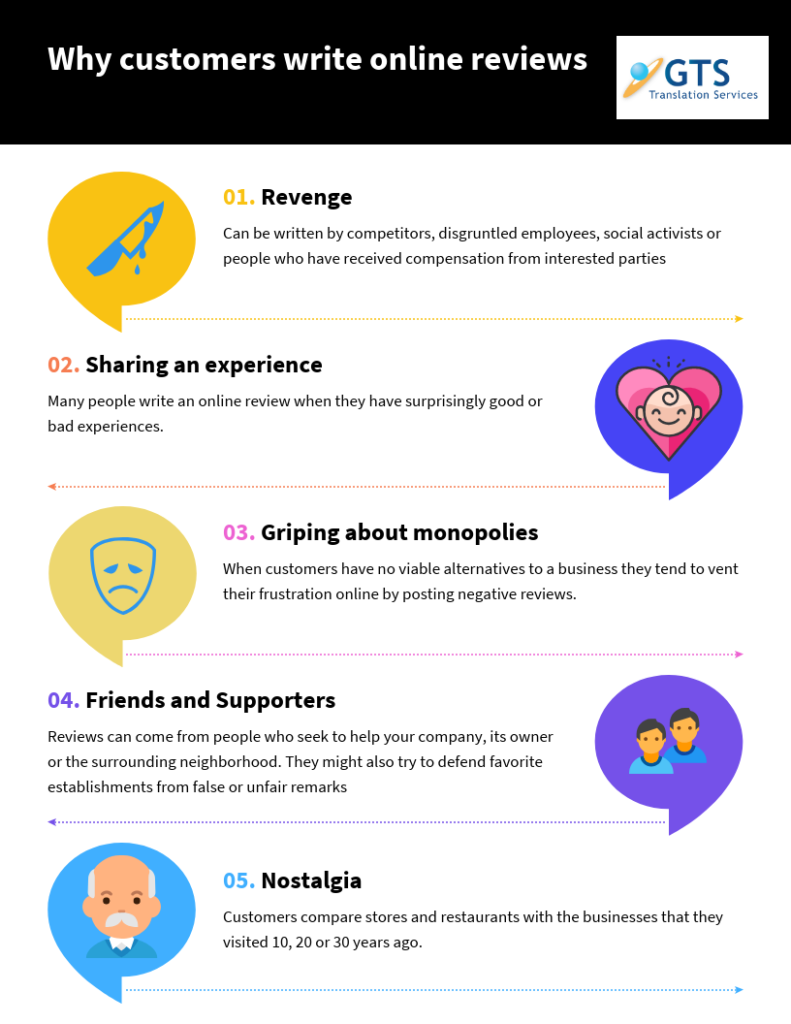Online reviews can have a big impact on shops, restaurants, hotels, service providers, and other businesses. According to recent studies of consumer habits, 9 out of 10 customers won’t enter an establishment without looking at internet ratings. Most people believe the information in these reviews. Consequently, it’s important to understand why customers write them. This posts details some of the motivating factors behind online reviews and also discusses some of the incentives that customers have when leaving a review.

Revenge
Some reviewers have ulterior motives for writing negative reviews online. They can be competitors, disgruntled employees, social activists or people who have received compensation from interested parties. Fake reviews violate the law in the USA and in other countries, but it’s not easy to prosecute offenders. Businesses can counteract misinformation by reporting rule violations and vulgar material to review websites while encouraging patrons to post honest feedback. The drawback is that some review sites, like Yelp and Google Places, are not quick to remove negative reviews and sometimes will not remove them at all.
If a business owner or sales representative regularly have conversations with appreciative customers, he or she might benefit from telling them about suspicious negative ratings. These individuals could learn about the potentially harmful effects of the reviews and the business owner’s reasons to doubt their authenticity. Some companies have found that loyal patrons will react by going online and posting positive feedback.
Sharing Experiences Good and Bad
The majority of ratings and comments come from legitimate customers. Survey data indicates that people usually write reviews when they have surprisingly good or bad experiences. Many express negative opinions to provide feedback and warn fellow shoppers. However, around one-fifth of reviewers admit to posting critical words in an effort to take revenge.
People tend to rate businesses harshly when they encounter poor customer service or an unpleasant atmosphere. Low-quality products can also provoke negative feedback. Most clients will only complain about prices if the expense increases rapidly or they face unexpectedly large bills. For instance, some unfavorable reviews focus on inaccurate quotes or costly products with no price tags.
Nostalgic Reviews
When they write about older companies, people often accuse these establishments of “going downhill.” Customers compare stores and restaurants with the businesses that they visited 10, 20 or 30 years ago. Many of these statements reflect reality, but nostalgia distorts some memories. Nonetheless, proprietors may benefit from thinking twice before they change popular products or policies.
Backlash Against Monopolies
One of the reasons for negative reviews is that people feel they don’t have any viable alternatives to a business. Customers can’t switch providers, so they post harsh comments instead. Gas, power and telecom companies frequently suffer from low ratings. If a firm doesn’t face any major competitors, it must not take clients for granted or use marketing language that highlights the lack of alternatives.
Supporters
Almost one of out 10 reviews come from people who seek to help a company, its owner or the surrounding neighborhood. They might also try to defend favorite establishments from false or unfair remarks. Small firms are more likely to receive this type of positive review. Business owners can benefit from developing friendly relationships with customers who want to see them succeed.
In Summary
To sum it up, people have a wide range of reasons for writing reviews. Many individuals simply want to help others. At the same time, some reviewers have vengeful aims or hope to profit from their comments. Companies that understand these motives can wisely optimize their practices in an effort to gain higher ratings.
GTS Translation, the publisher of this blog, is consistently ranked as one of the best rated translation service companies.





